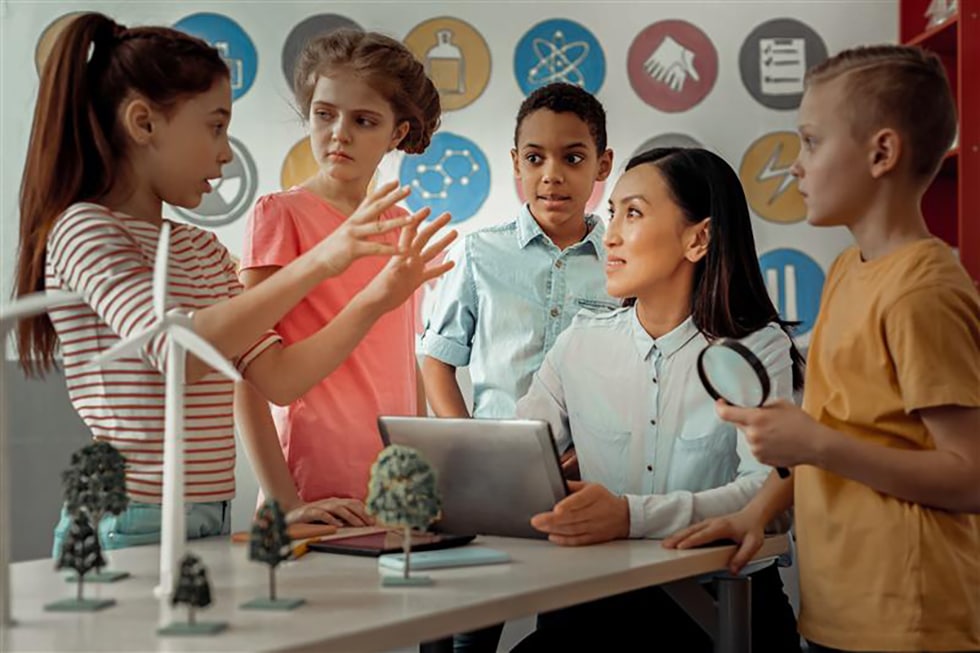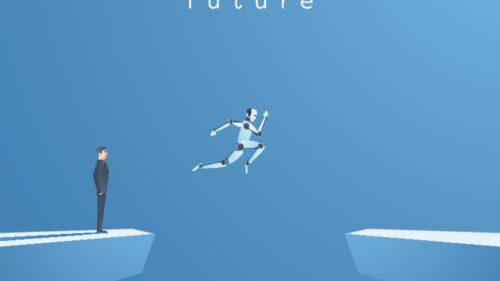In a previous article, “Once AI can do everything for us, what do we do?” I discussed how, with the rise of AI, humans are rapidly becoming physically and cognitively obsolete. This is because automation and AI are becoming so productive and creative that humans cannot compete with them in any conceivable field. Soon, humans will no longer need to work to survive.
Consequently, the survival instinct, the core driver of human activity, will also become obsolete. Younger generations must be raised to develop their own motivations and goals to prevent their physical and mental atrophy. It is urgent to replace the current productivity-driven education systems with an alternate model that fosters personal growth. This model will preserve children’s innate authenticity and alertness. Providing them with an environment that motivates them to reach their full potential will ensure that children will enjoy a life-long journey of personal growth in a society where AI replaces the need for survival-driven productivity.
Universal basic income will encourage us to focus on personal growth
The positive side of this dominance is that wealth produced by societies will rise to new levels with only a marginal human contribution. Societies and governments will need to redistribute this wealth among the general population in the form of a universal basic income (UBI). The Forbes article, “Will AI Make Universal Basic Income Inevitable?” defines UBI as payments made to citizens that cover the basic cost of living. Numerous researchers and technology leaders argue that this will occur sooner rather than later. Technology pioneer Elon Musk claims that “probably none of us will have a job” once AI becomes prevalent, making UBI necessary.
The introduction of UBI will no doubt render humans’ innate survival instinct irrelevant. This is a hard idea to grasp, as survival has driven productivity in humans since the beginning. Psychologist Dr. Jim Taylor argues that “the human instinct to survive is our most powerful drive,” and that “just about everything that humans have become serves that essential purpose.” Furthermore, Daniel Kahneman, a psychologist who won the 2002 Nobel Prize in Economics, has shown that the way “we process and remember information, problem solve and make decisions” is aimed at optimizing our survival chances. Our “fight or flight” reaction is a well-known example of our survival instinct in action.
Societies will face the challenge of replacing this survival instinct with motivations toward personal growth and development as the core driving force of humanity. Humans should be focused on proactively utilizing our full potentials — physical, intellectual, emotional, social and spiritual — to enjoy meaningful and fulfilling lives. Otherwise, without survival instincts, unmotivated individuals will most likely experience physical and mental deterioration.
It is important to briefly clarify the difference between personal growth and personal development. Personal growth refers to the internal transformation of our mindset and self-awareness. Personal development focuses on external improvements, such as acquiring new skills and abilities. Thus, personal growth can be seen as a lifelong process of becoming a “better” you, while personal development is about acquiring new knowledge. While personal development can contribute to personal growth, it should not replace it as the central objective in the upbringing of the younger generations.
Education models must prepare children for this kind of future
Therefore, it is urgent that we provide the younger generations with an environment that fosters the development of these self-constructed motivations. Unfortunately, existing educational models predominantly anchor themselves in the past. These education models aim to foster development in order to increase individual productivity, not personal growth.
Developed societies must gradually abandon their education systems and replace them with an upbringing model that “empowers and motivates individuals to explore their potential at every stage of life.” A detailed description of this new upbringing paradigm is beyond the scope of this piece, but I will describe two basic principles that should guide the upbringing of our youth. I will also outline five fundamental changes that must be made to the existing educational models to go beyond survival and provide the younger generations with an environment that fosters personal growth.
The first principle focuses on preserving the innate authenticity of children by encouraging them to behave and speak in ways that reflect their true selves. In other words, children’s feelings, thoughts, words and actions should remain coherent in every circumstance they encounter. Montessori schools are an example of an effort to nurture children’s authenticity by ensuring they do not feel compelled to mask or change themselves to fit what they think those around them expect. It is important to note that this does not mean that they should be allowed to do whatever they want. Developing personal discipline and respect for social norms are still integral in this model, but should not erode children’s authenticity.
The second principle is to foster and transform children’s innate sense of wonder into alertness. According to the National Institute of Health, young children’s sense of wonder is their “inner desire to learn that awaits reality in order to be awakened.” Over time, this sense of wonder transforms into alertness, the cognitive state of being engaged and aware. It is well established that young children are alert most of the time, and that their curiosity can be aroused by anything novel in their surroundings. Encouraging this alertness is fundamental to fostering their personal growth and enriching their upbringing.
New education models will be focused on personal exploration
In order to adhere to these two principles, changes must be made to current education models. Education must reflect the opportunities offered by a society where individuals are not obligated to work. The most important and necessary change to the education system is that learning should consist primarily of personal exploration and discovery in the real world, making traditional school buildings unnecessary. It should not be focused on churning out productive workers.
This leads to the second necessary change: replacing rigid, standardized learning with immersion learning through experiences that are relevant and interesting to the child. Due to the eclectic nature of the globalized world, children should also be immersed in different environmental and cultural settings for extended periods of time to develop a critical understanding of them.
The third change is a shift to grouping children by shared interests rather than age, which fosters a more engaging learning environment. This means that children will be part of a group where shared enthusiasm can reinforce experiences. Children should change groups over time to reflect their evolving interests and maturity levels.
As a fourth change, we should place an emphasis on children maturing alongside their learning. That is, children should not be asked to accumulate standardized knowledge just for the sake of memorizing. Instead, they should be immersed in experiences that allow them to process knowledge and grow as people.
Finally, the number of guiding values and objectives used in the upbringing model should be minimized. Those that remain should preferably be based on established, robust psychology and neuroscience, rather than on subjective cultural dogmas of any kind. This will ensure that the education models are healthy for children and guarantee personal growth.
Once this novel upbringing paradigm is well-defined, it cannot be implemented on a large scale like current educational systems are. Rather, the model should serve as a reference toward which current educational models can gradually transition. Numerous projects have already made valuable contributions to the necessary shift. Examples include “forest kindergartens” in Denmark, where children play freely in nature for several years; project-based activities in Norway, where homework and exams have been eliminated; and the Montessori and Waldorf schools, which provide models that engage students’ potentials more effectively. However, while these are all significant improvements, they ultimately still adhere to the soon-obsolete objective of shaping children into productive members of society.
Parents must start this academic evolution
Now, the following question arises: Who should lead the transition from the traditional education system to the new upbringing model? Governments cannot be expected to take the lead because their decision-making process is bureaucratic in nature and only reactive to public demands. Therefore, parents must take the lead in starting the transition. They must be aware that their children will suffer the detrimental consequences from being raised in an obsolete educational system.
Fortunately, parents will have plenty of time to engage deeply in their children’s education, because the proliferation of AI will mean that they will not have to work.
[Cheyenne Torres edited this piece.]
The views expressed in this article are the author’s own and do not necessarily reflect Fair Observer’s editorial policy.
Support Fair Observer
We rely on your support for our independence, diversity and quality.
For more than 10 years, Fair Observer has been free, fair and independent. No billionaire owns us, no advertisers control us. We are a reader-supported nonprofit. Unlike many other publications, we keep our content free for readers regardless of where they live or whether they can afford to pay. We have no paywalls and no ads.
In the post-truth era of fake news, echo chambers and filter bubbles, we publish a plurality of perspectives from around the world. Anyone can publish with us, but everyone goes through a rigorous editorial process. So, you get fact-checked, well-reasoned content instead of noise.
We publish 3,000+ voices from 90+ countries. We also conduct education and training programs
on subjects ranging from digital media and journalism to writing and critical thinking. This
doesn’t come cheap. Servers, editors, trainers and web developers cost
money.
Please consider supporting us on a regular basis as a recurring donor or a
sustaining member.
Will you support FO’s journalism?
We rely on your support for our independence, diversity and quality.








Comment
There are three obviously identifiable obstacles to achieving this and a less obvious fourth one beyond it. The 1st is, as noted, current institutions, govt and education. The 2nd is an economic system that only allows serious investment in ventures focused on short term profit. The 3rd is the failure to frame any question in both collective and historical terms rather than the “individual mind.” Finally, telling parents they need to get the job done is illusory. A cultural force is required.